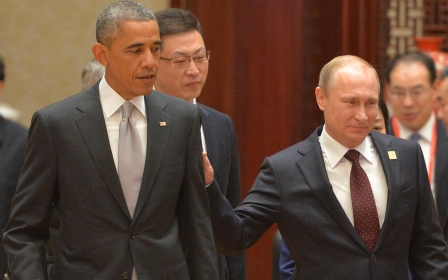Assad's women soldiers complain of sexual harassment

Female Syrian government fighters have complained on video of their sexual harassment at the hands of senior officers, in an apparent rare show of dissent among forces loyal to Syrian President Bashar al-Assad.
In a video released on social media, three female fighters of the "Secret Panthers" Brigade 130, said they had experienced "unethical treatment" and had been discriminated against on the basis of their physical appearance:
"We left families and civilian life to join the army to defend our land and president, not to be degraded or to join the prostitution industry," explained one woman, speaking to the camera.
Another woman pointed out that her husband is a fighter, adding that she is proud of him because he is part of the paramilitary National Defence Forces (NDF) "who are better than the officers in the 130 Brigade".
"Officers in 130 Brigade took girls for their own personal interests and started exchanging them between themselves," she explained. "If they like a girl they keep her and if they don’t like her, they degrade her. I am a mother and have a child who I have left to join the fight for my land, but unfortunately the officers are thieves and they took our money, food and drink, and we only get unethical treatment."
One of the women said she asked a colonel in the brigade for a holiday to see her two children, but her request was refused because "she is not pretty". The colonel wanted to do "stuff" with her and when she tried going to the the brigade general to complain "he kicked her out of the office at the door", she added.
The women said they are kept under the sun every day from 8am to 2pm with no food or water or toilets. In the video they appeal to Russian forces in the Hmeimim air base to aid their situation.
"They want us to act like we are training in front of the Russians but that's not true. We are not getting any training, and this ID is not genuine [as] I keep getting stopped at barriers," said one of the women, holding up a pass.
"We are not getting paid enough or given anything good in return. We are here to defend our land but they are not giving us anything."
According to a report in France24, there are 800 women enlisted to fight on the side of Assad, primarily as part of the Lionesses of Defence, an all-women faction in the Syrian Republican Guard in Damascus.
Analysts have argued that Assad's decision to use female fighters comes from a desire to present himself to the world as a progressive and secular alternative to hard-line Islamist groups in Syria.
His father, Hafez al-Assad, who ruled Syria from 1971 to 2000, also included female battalions in the army partly as a means of boosting his country's secular credentials.
"Bashar al-Assad wants to sell himself as a model of modernity, opposed to the obscurantism of jihadist groups such as Daesh (Islamic State) or Al-Nusra Front," said Fabrice Balanche, director of Gremmo, a research group on the Mediterranean and Middle East, speaking to France24.
"The war in Syria is a face-off between two societal structures and Assad is showing that, in his system, women have an important role, even in the defence forces."
Joshua Landis, head of the Center for Middle East Studies at the University of Oklahoma, said that despite "progressive" laws in Syria, society remained "discriminatory against women".
"These complaints by Syrian women reveal how patriarchal Syrian society and the Syrian Arab Army remains," he told Middle East Eye. "Women's liberation has a long way to go."
Yezid Sayigh, a senior associate at the Carnegie Middle East Center, said that the video did not necessarily indicate dissent among Assad's ranks.
"Sexual harassment by ranking officers of female subordinates happens in many armies, including the US and IDF (Israeli Defence Forces), so I wouldn't be surprised - and I wouldn't draw broad conclusions about the level of dissatisfaction in the army on that basis alone," he told MEE.
Although military service exists for women in some countries around the world, largely women have been excluded from combat activity. In the US, even as late as 2015, the commandant of the Marine Corps recommended that women be excluded from competing for certain front-line combat jobs, despite a promise in 2015 from Secretary of Defence Ash Carter that all combat jobs would be opened to women.
In Syria, the heavy involvement of women in the pro-Kurdish People's Protection Units (YPG) fighting against IS has drawn headlines globally, partly due to the symbolism of female fighters clashing with a group viewed by many as intrinsically misogynistic.
Stay informed with MEE's newsletters
Sign up to get the latest alerts, insights and analysis, starting with Turkey Unpacked
Middle East Eye delivers independent and unrivalled coverage and analysis of the Middle East, North Africa and beyond. To learn more about republishing this content and the associated fees, please fill out this form. More about MEE can be found here.




